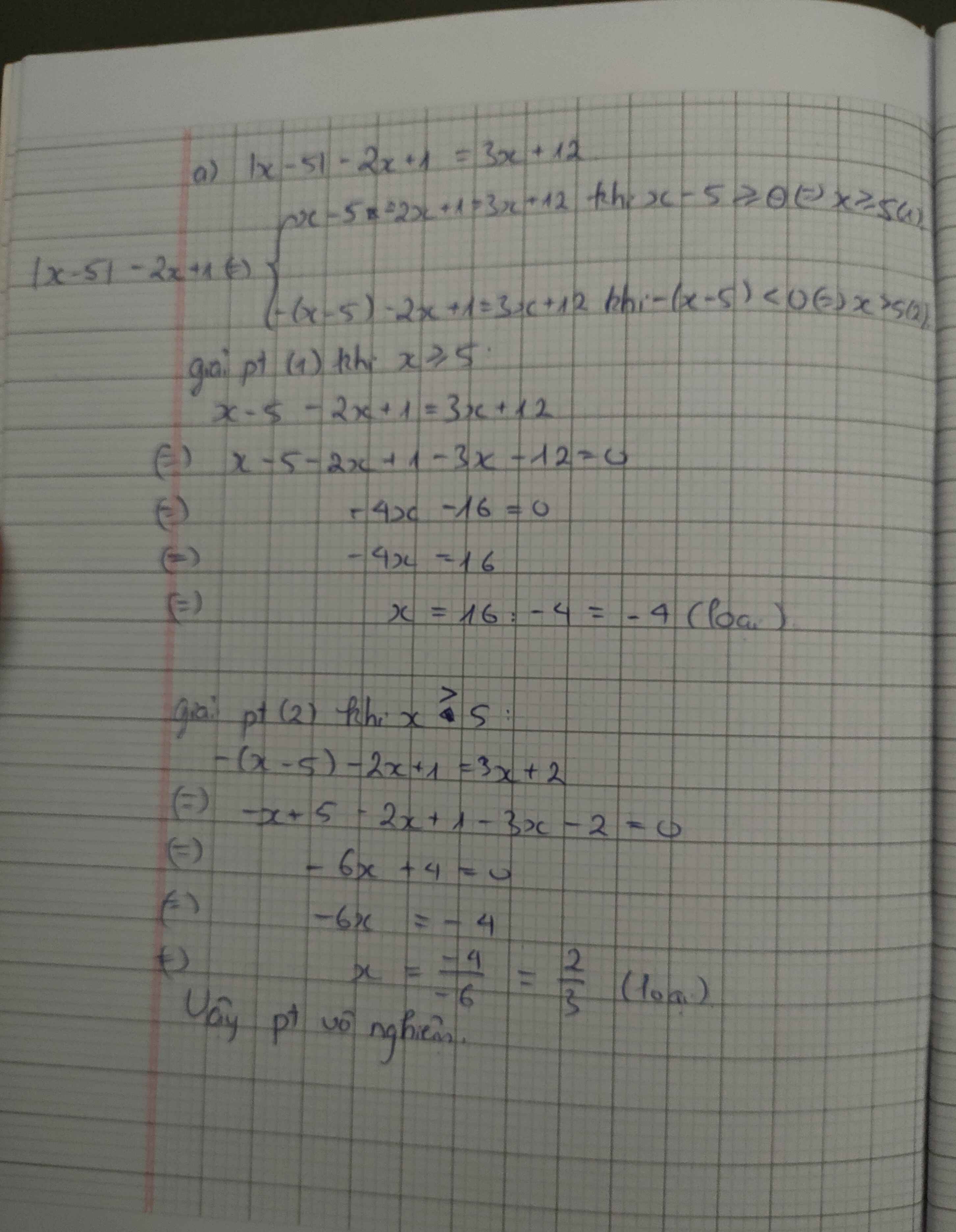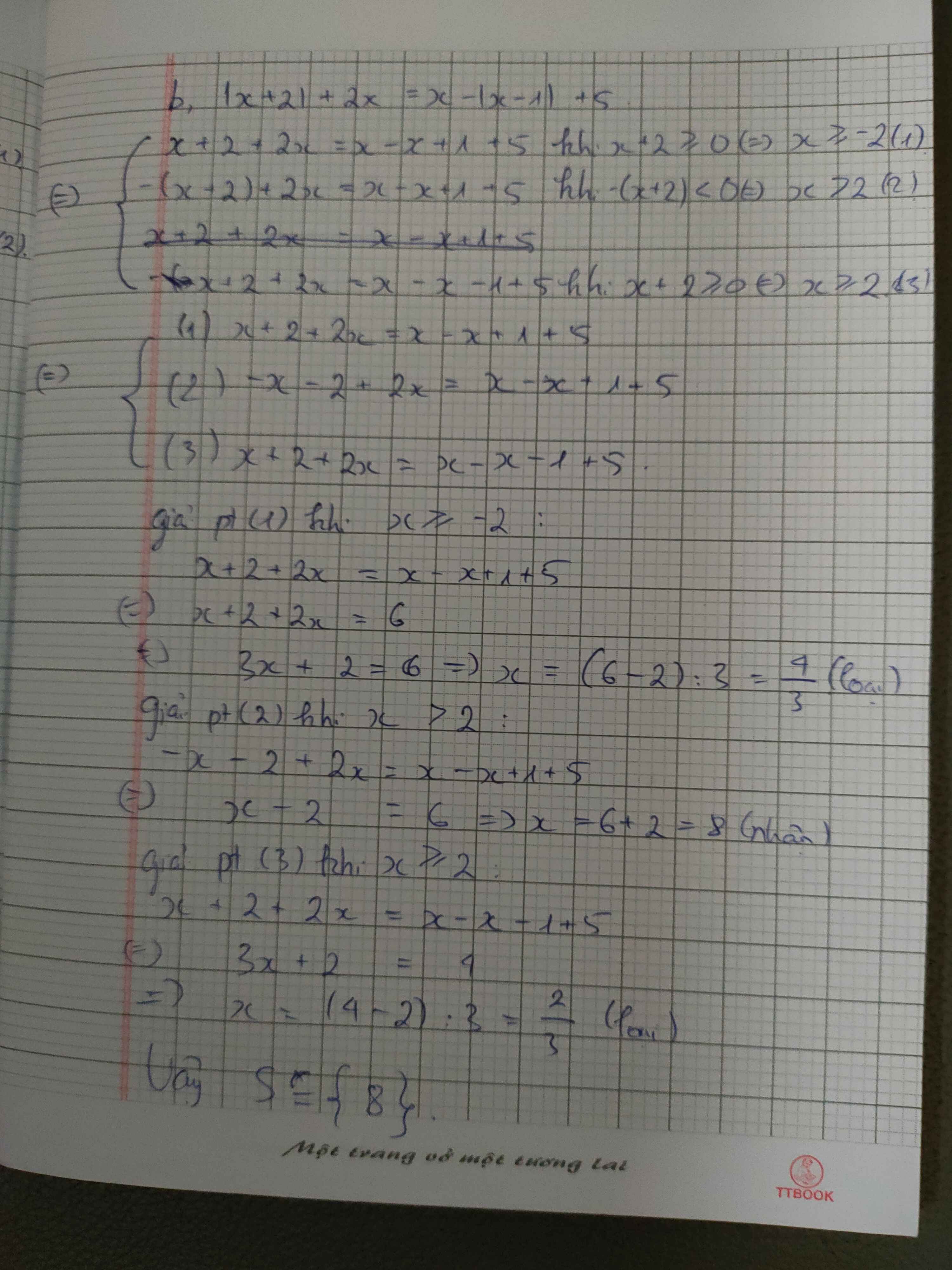Hãy nhập câu hỏi của bạn vào đây, nếu là tài khoản VIP, bạn sẽ được ưu tiên trả lời.


a)\(2x^2\)+\(3\left(x^2-1\right)\)=\(5x\left(x+1\right)\)
\(2x^2\)+\(3x^2\)\(-3\)=\(5x^2+5x\)
\(5x^2-5x^2-5x=3\)
\(-5x=3\)
\(x=\frac{-3}{5}\)
tự ghi dấu suy ra ở đằng trước nhé
b) Vì \(2x\left(5-3x\right)=2x\left(3x-5\right)-3\left(x-7\right)=3\)
nên chỉ cần giải: \(6x^2-10x-3x+21=3\)
\(\Leftrightarrow6x^2-13x+21=3\)
\(\Leftrightarrow6x^2-13x+18=0\)
\(\Rightarrow\)pt vô nghiệm

a) ( 2x - 1 )( 2x + 1 ) - ( x - 1 )2 = 3x( x - 2 )
<=> 4x2 - 1 - ( x2 - 2x + 1 ) - 3x( x - 2 ) = 0
<=> 4x2 - 1 - x2 + 2x - 1 - 3x2 + 6x = 0
<=> 8x - 2 = 0
<=> x = 1/4
Vậy phương trình có 1 nghiệm x = 1/4
b) ( 4x - 3 )( 3x + 2 ) = 2( 3x - 1 )( 2x + 5 )
<=> 12x2 - x - 6 - 2( 6x2 + 13x - 5 ) = 0
<=> 12x2 - x - 6 - 12x2 - 26x + 10 = 0
<=> -27x + 4 = 0
<=> x = 4/27
Vậy phương trình có 1 nghiệm x = 4/27
c) ( x - 1 )( x2 + x + 1 ) - 5( 2x - 3 ) = x( x2 - 3 )
<=> x3 - 1 - 10x + 15 - x( x2 - 3 ) = 0
<=> x3 + 14 - 10x - x3 + 3x = 0
<=> -7x + 14 = 0
<=> x = 2
Vậy phương trình có nghiệm x = 2
d) \(\frac{3x-2}{4}-\frac{x+4}{3}=\frac{1+x}{12}\)
<=> \(\frac{3x}{4}-\frac{2}{4}-\frac{x}{3}-\frac{4}{3}=\frac{1}{12}+\frac{x}{12}\)
<=> \(\frac{3}{4}x-\frac{1}{3}x-\frac{1}{12}x=\frac{1}{12}+\frac{1}{2}+\frac{4}{3}\)
<=> \(x\left(\frac{3}{4}-\frac{1}{3}-\frac{1}{12}\right)=\frac{23}{12}\)
<=> \(x\cdot\frac{1}{3}=\frac{23}{12}\)
<=> x = 23/4
Vậy phương trình có 1 nghiệm x = 23/4

A = 2x2 - 6xy - 3xy - 6y - 2x2 + 8xy + 6y
= - xy
= \(\frac{2}{3}\)\(x\)\(\frac{3}{4}\)
= \(\frac{1}{2}\)
mk đang bận mấy câu kia tương tự nha

(8x−3)(3x+2)−(4x+7)(x+4)=(2x+1)(5x−1)(8x−3)(3x+2)−(4x+7)(x+4)=(2x+1)(5x−1)
20x2−16x−34=10x2+3x−120x2−16x−34=10x2+3x−1
10x2−19x−33=010x2−19x−33=0
(10x+11)(x−3)=0
chỉ bt lm con b thoy
..army,,,,,,,,,,
a) \(\left(2x+3\right)\left(x-4\right)+\left(x-5\right)\left(x-2\right)=\left(3x-5\right)\left(x-4\right)\)
\(\Leftrightarrow3x^2-12x-2=3x^2-17x+20\)
\(\Leftrightarrow3x^2-12x=3x^2-17x+20+2\)
\(\Leftrightarrow3x^2-12x=3x^2-17x+22\left(3x^2-17x\right)\)
\(\Leftrightarrow5x=22\)
\(\Rightarrow x=\frac{22}{5}\)
b) \(\left(8x-3\right)\left(3x+2\right)-\left(4x+7\right)\left(x+4\right)=\left(2x+1\right)\left(5x-1\right)\)
\(\Leftrightarrow20x^2-16x-34=10x^2+3x+1\)
\(\Leftrightarrow20x^2-16x-33=10x^2+3x\)
\(\Leftrightarrow20x^2-16x-33=10x^2+3x-3x\)
\(\Leftrightarrow20x^2-16x-33=10x^2\)
\(\Leftrightarrow20x^2-16x-33=10x^2-10x^2\)
\(\Leftrightarrow20x^2-16x-33=0\)
\(\Rightarrow\orbr{\begin{cases}x=3\\x=-\frac{11}{10}\end{cases}}\)

Câu 1:
\(\left(x-2\right)\left(x^2+2x+4\right)+25x=x\left(x+5\right)\left(x-5\right)+8\)
\(\Leftrightarrow x^3-8+25x=x\left(x^2-25\right)+8\)
\(\Leftrightarrow x^3-8+25x=x^3-25x+8\)
\(\Leftrightarrow x^3-8+25x-x^3+25x-8=0\)
\(\Leftrightarrow50x-16=0\)
\(\Leftrightarrow50x=16\)
\(\Leftrightarrow x=\dfrac{8}{25}\)
Câu 2 :
\(\dfrac{x+5}{4}+\dfrac{3+2x}{3}=\dfrac{6x-1}{3}-\dfrac{1-2x}{12}\)
<=> \(\dfrac{3\left(x+5\right)}{12}+\dfrac{4\left(3+2x\right)}{12}=\dfrac{4\left(6x-1\right)}{12}-\dfrac{1-2x}{12}\)
<=>\(\dfrac{3x+15+12+8x}{12}=\dfrac{24x-4-1+2x}{12}\)
<=> 3x + 15 + 12 + 8x = 24x - 4 - 1 +2x
<=> 11x+27 = 26x -5
<=> ( 26x - 5 ) - ( 11x + 27 ) = 0
<=> 15x - 32 = 0
<=> 15x = 32
<=> x = \(\dfrac{32}{15}\)

a:=>x^2-1-x=2x-1
=>x^2-x-1=2x-1
=>x^2-3x=0
=>x=0(loại) hoặc x=3(nhận)
b:=>x+2=0 hoặc 5-3x=0
=>x=-2 hoặc x=5/3
c:=>20(1-2x)+6x=9(x-5)-24
=>20-40x+6x=9x-45-24
=>-34x+20=9x-69
=>-43x=-89
=>x=89/43
d: =>x^2+4x+4-x^2-2x+3=2x^2+8x-4x-16-3
=>2x^2+4x-19=-2x+7
=>2x^2+6x-26=0
=>x^2+3x-13=0
=>\(x=\dfrac{-3\pm\sqrt{61}}{2}\)
e: =>(2x-3)(2x-3-x-1)=0
=>(2x-3)(x-4)=0
=>x=4 hoặc x=3/2

a: \(A=\dfrac{x-1+2x^2+2x+2-x^2-2x}{\left(x-1\right)\left(x^2+x+1\right)}\)
\(=\dfrac{x^2+x+1}{\left(x-1\right)\left(x^2+x+1\right)}=\dfrac{1}{x-1}\)


a: =>|x-5|=3x+12+2x-1=5x+11
TH1: x>=5
=>x-5=5x+11
=>-4x=16
=>x=-4(loại)
TH2: x<5
=>5-x=5x+11
=>-6x=-6
=>x=1(nhận)
b: =>|x+2|-|x-1|=x+5-2x=-x+5
TH1: x<-2
=>-x-2-(1-x)=-x+5
=>-x-2-1+x=-x+5
=>x-3=5
=>x=8(nhận)
Th2: -2<=x<1
=>x+2-1+x=-x+5
=>2x+1=-x+5
=>3x=4
=>x=4/3(loại)
TH3: x>=1
=>-x+5=x+2+1-x=3
=>-x=-2
=>x=2(nhận)